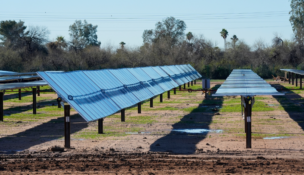ADWR says Central Arizona Project is overstating its role in water issues
Rachel Leingang//March 22, 2017//[read_meter]
ADWR says Central Arizona Project is overstating its role in water issues
Rachel Leingang//March 22, 2017//[read_meter]
In this April 16, 2013 file photo, the high water mark for Lake Mead is seen on Hoover Dam and its spillway near Boulder City, Nevada....

















